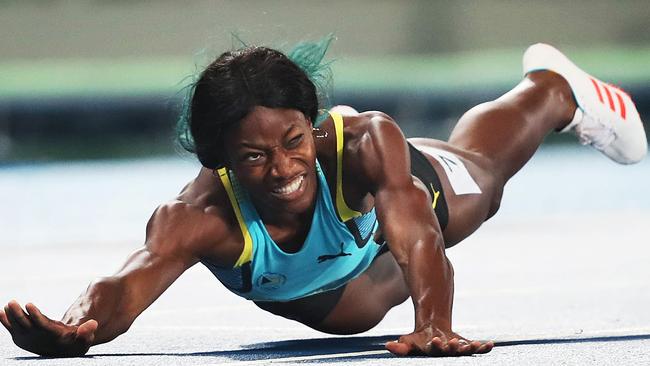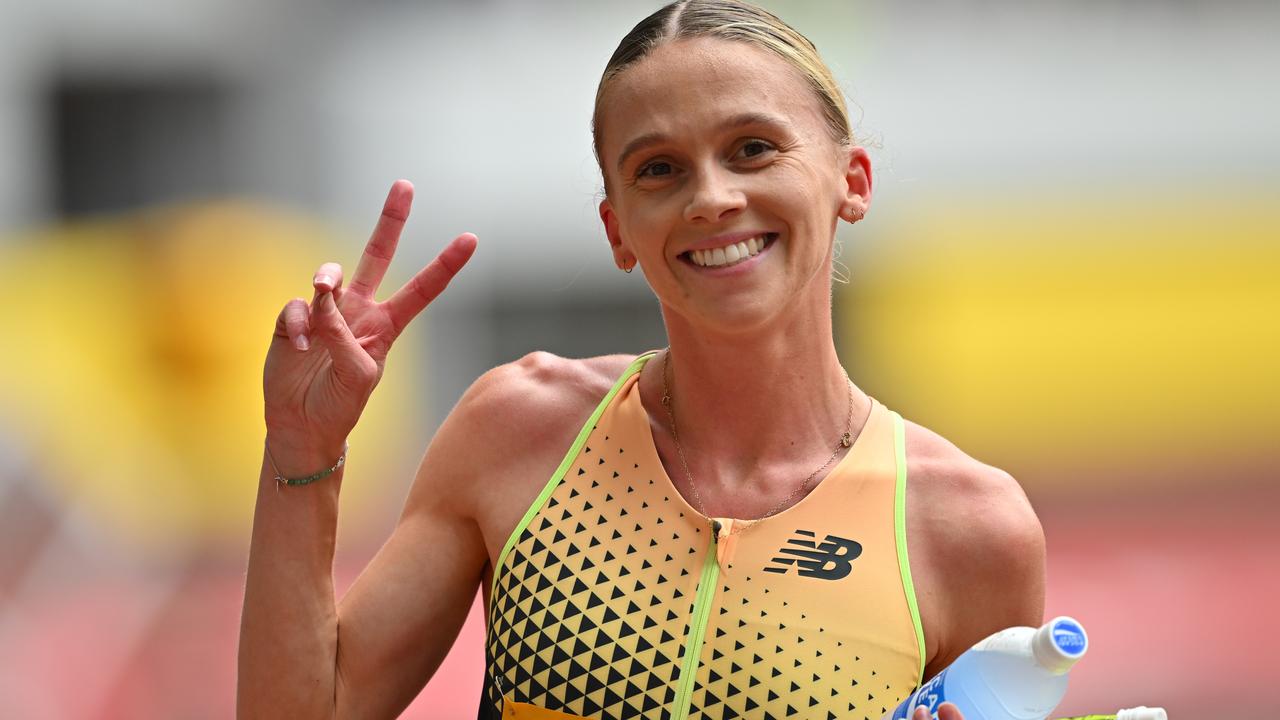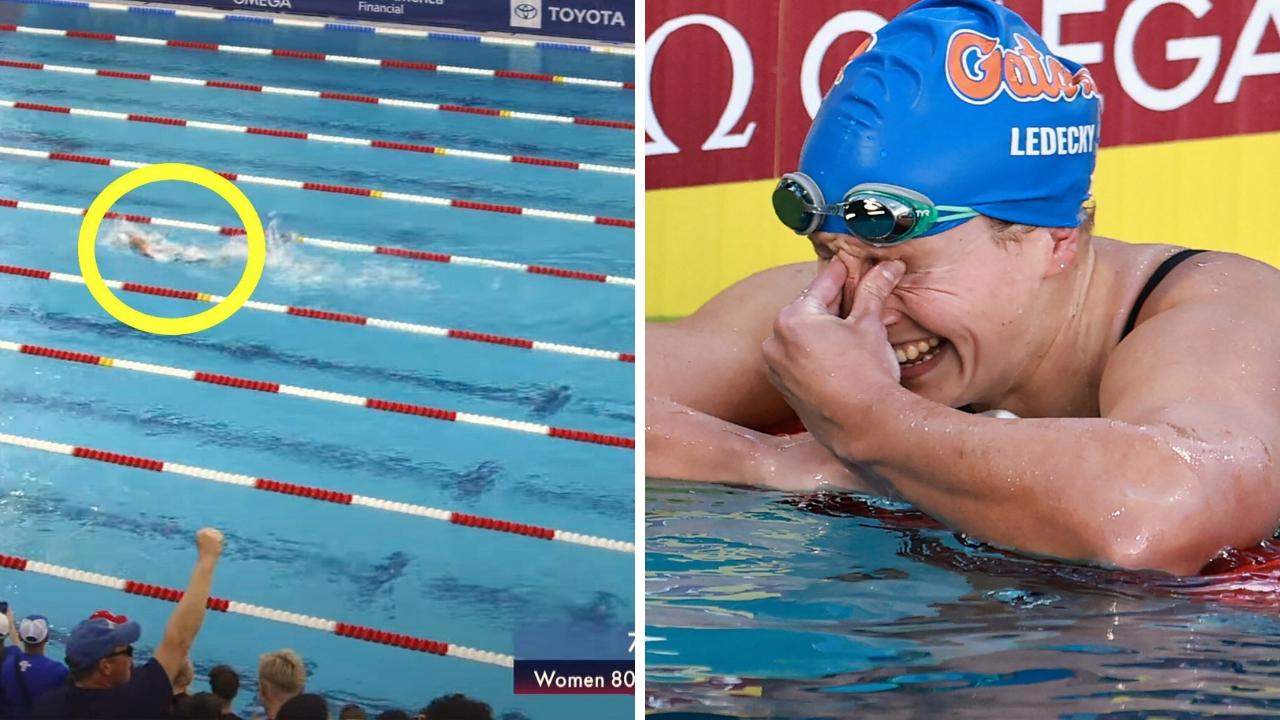Olympic swagger and the mentality of winning in Rio
IT’S called “Olympic swagger”. And when it comes to the Rio Games, you either have it or you don’t.
IT’S called “Olympic swagger”. And when it comes to the Rio Games, you either have it or you don’t.
It’s more than just mental strength, it’s about being able to strut like a sporting rock star.
Every time those with it walk into the Olympic filed of play they know ‘I’ve got this’.
Think the American swim team. Or the British track cyclists.
Even the Chinese divers and the Fiji rugby sevens boys.
They are the teams and individuals who arrived in Rio carrying more pressure than any others to win gold, but stood tall and delivered when it mattered most.
They’ve all been beaten before, defeated many times in the past few years either at world championships, world cups or even their own trials, but in the Olympic arena they were the dominant force.
For the US swim team it was personal. Australia had put the Yanks on notice 12 months earlier when they effectively beat them in the medal tally for Olympic events at the world titles in Kazan.
When the two teams saw each other for the first time in Rio, the Americans had swagger but some of our finest just had stagger.
“They are a powerhouse and you can definitely feel their presence in the pool,” Cameron McEvoy said three days before competition started.
McEvoy is the fastest swimmer in the world right now. His best 100m freestyle time is faster than anyone has swum in a textile suit.
If anybody should be able to walk into a room and think ‘I got this’, it’s McEvoy.
It’s not arrogance or disrespect, it’s trusting your ability to execute what you’ve done previously.
As history shows, McEvoy fell short. He succumbed to nerves and was beaten for the gold — thankfully by a teammate.
But McEvoy wasn’t the only Australian swimmer to fall short of his best in Rio. There was Cate Campbell and Emily Seebohm who both also swam considerably slower than they’d done for some time and it cost them medals.
But in Team USA there was no such outcome. They won eight gold medals at last year’s world titles and doubled that tally to 16 at the Olympics.
It defied belief for everyone except those within their own squad, as team leader Nathan Adrian explained.
“That was an incredible performance by Team USA,” he said.
“For me the coolest part was looking back a year ago and coming away from a not as successful world championships as Team USA is used to and saying: ‘hey, we are not worried about the Olympics. We are Team USA and we’re going to step up’.
“Now we’re here with an amazing performance. 33 medals isn’t so bad, there’s only a couple of events (three of 32 events) we didn’t medal in. This is just something really special to be part of.”
Australian head coach Jacco Verhaeren put some of the Dolphins’ bad swims down to nerves, deflecting questions about the timing of Australia’s trials or that anxiety was endemic within the team as he promised a full review of where the pool went so wrong.
“I always like to think there is a famous quote, ‘you never lose you either win or learn’ and we definitely take learnings from our losses,” he said.
“There is no generic reason why some people step up and others don’t.
“Every performance has its own journey, own story, this is what we need to find out.”
Certainly the US believe their system, from college racing all the way to conducting their trials five weeks before the Olympics, makes their swimmers tougher than anyone else.
Triple gold medallist Ryan Murphy, who beat Australia’s dual world champion Mitch Larkin to backstroke golds, said the US system made Olympics feel easy in comparison.
“I think NCAA swimming is huge for the US. It teaches you how to be in a pressure environment and utilise the excitement and energy of the people around you rather than shrinking with that type of pressure,” Murphy said.
“Then you have Olympic trials … it is a much more pressure packed meet than the Olympics I would say. You’re fighting just to swim another day.
“We only do that just a month prior to the Olympics so I know for me I got here and I was walking into the finals before the 100m backstroke and I was like ‘man I was so much more nervous at Olympic trials’. I think that is a huge contributing factor.
“I don’t think we lost a close race throughout the meet. I swear every single time there was a touch we were getting our hand on the wall first. I think that goes back to the culture of the team and the unity we have.”
When it comes to cycling and in particular on the track, no one talks the talk and walks the walk like Great Britain.
Everything about the Poms screams swagger. Heads turn when they walk into the velodrome, there is a fascination with their bikes, what wheels they’re using, the helmets they’ve got, their sock height, and the media hangs off every word that comes out of Sir Bradley Wiggins’ mouth.
In Beijing and London combined they won 16 gold medals in cycling.
In Rio they’ve so far won six and all on the velodrome which left several nations scratching their heads and asking ‘what are they doing and how are they doing it?’
That of course would only feed the British egos and Australian sprinter Matthew Glaetzer said they would be loving it.
“The British don’t really rock up until the Games every four years and are very good at it, and we never know what their form is going to be like,” Glaetzer said of the mystery surrounding their archrival.
“All you know is what you do, we have no idea what they do, at the end of the day there are not too many things they could be doing drastically different.
“It’s just that they always come up with a crazy floor at the Olympics and from athletes that we didn’t expect to have that sort of speed.
“It does surprise us but I’m not quite sure how we would have a method of catching them.
“We did our best, I was happy with our prep and we rock up and they absolutely blitz (everyone) across the board.
“They’ve got it figured out and we’re going to do our best to find out what we need to do to catch up to them.”
The trash talking from Team GB started before the Games when Wiggins claimed the Aussies were “obsessed” with them.
But even after the track competition finished this week in which GB won six gold medals to Australia’s none, Australian high performance manager Kevin Tabotta said that wasn’t the case.
“We deliberately don’t concentrate on them, that I can tell you,” Tabotta said.
“Every time I get asked that question I say ‘this is a sport where there is 40 or 50 nations’ and at the end of the day we concentrate on our own performances and the times required to win gold medals, and we don’t talk about any other country until it’s a racing situation.”
At the start of the week, British Cycling head coach Iain Dyer told News Corp he believed Team GB was psyching other nations out because of their success.
“You see it in training before we even step up in competition, teams will run the cameras on us or put the watches on us and we can see their reactions,” Dyer said.
“It’s good, it’s a nice position.”
And so the quest to catch Great Britain, both physically and mentally, goes on.
“I don’t know, if you have any ideas, let me know,” Australian cyclist Annette Edmondson said.
Even the AOC are bereft of ideas. Chef de mission Kitty Chiller knows tough questions need to be asked after these Games, they’re just not sure what questions to ask.
Is it athletes falling short or athletes being let down by coaching and preparation?
So far all the blame has been put on the athletes. Verhaeren said swimmers like McEvoy suffered “stage fright”. But it could be the latter. It could be the pressure to live up to the AOC’s own medal predictions that put the yips into our champs.
Chiller doesn’t believe the AOC could have done more to help the sports or athletes, but no-one should be immune to the Olympic post-mortem.
“To be honest from an Olympic preparation point of view the AOC role in the Olympic Games is to provide an environment in the Olympic city that facilitates success,” Chiller said.
“I think we have done that, the feeling in the team on and off the field of play is still fantastic.
“We’ve delivered a performance focused-environment. At the end of the day we can’t run or jump on the track, or jump on the velodrome, or jump in the pool, our sports have the opportunity to perform.
“But it’s tough. How do you beat those British cyclists? Nearly every event they went in was a world record. Our swimmers have done their very best, our cyclists are doing their very best.
“I can’t comment technically on the preparations of individual sports. It’s not the role of the AOC and it’s something that shouldn’t be done here, it should be done in the fullness of time by the federations after the Games.”
Originally published as Olympic swagger and the mentality of winning in Rio




